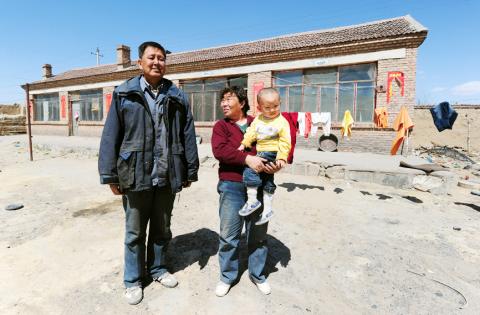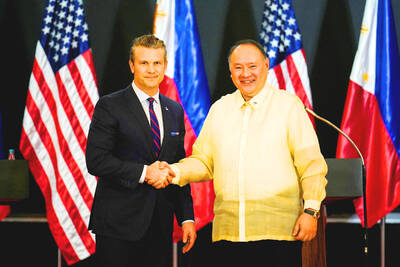Farmer Wang Tao used to grow corn, potatoes and wheat within a stone’s throw of a dumping ground for rare earths waste until toxic chemicals leaked into the water supply and poisoned his land.
Farmers living near the 10km2 expanse in northern China say they have lost teeth and their hair has turned white while tests show the soil and water contain high levels of cancer-causing radioactive materials.
“We are victims. The tailings dam has contaminated us,” Wang, 60, said at his home near Baotou city in Inner Mongolia, home to the world’s largest deposits of rare earths, which are vital in making many high-tech products.

Photo: AFP
“In this place, if you eat the contaminated food or drink the contaminated water it will harm your body,” Wang said, pointing toward lifeless fields now strewn with rubbish around Dalahai village, a few hundred meters from the dump.
China produces more than 95 percent of the world’s rare earths — 17 elements used in the manufacture of products ranging from iPods to flat-screen televisions and electric cars.
Two-thirds of that is processed in mineral-rich Baotou on the edge of the Gobi desert.
Environmental groups have long criticized rare earths mining for spewing toxic chemicals and radioactive thorium and uranium into the air, water and soil, which can cause cancer and birth defects among residents and animals.
Beijing, keen to burnish its green credentials and tighten its grip over the highly sought-after metals, has started cleaning up the industry by closing illegal mines, setting tougher environmental standards and restricting exports.
However, Wang and the other farmers in Dalahai blame state-owned giant Baogang Group, China’s largest producer of rare earths and a major iron ore miner and steel producer, for poisoning their fields and ruining their livelihoods.
Strong winds whip across the millions of tonnes of waste at the dump, blowing toxic and radioactive materials toward local villages.
“It is the pollution from the tailings dam,” Wang Er, 52, said, pointing a dirty finger at his spiky hair that started turning white 30 years ago.
Baogang, which has rare earths and iron ore refineries stretching for about 7km along a road in the area, did not respond to reporter requests for comment.
However, a 2006 study by local environment authorities showed levels of thorium, a by-product of rare earths processing, in Dalahai’s soil were 36 times higher than other areas of Baotou, state media have reported.
“People are suffering severely,” the Chinese-language National Business Daily said in December, citing the official study.
Sixty-six villagers died of cancer between 1993 and 2005 while crop yields fell “substantially.”
“There is not one step of the rare earth mining process that is not disastrous to the environment,” Greenpeace China’s toxics campaign manager Jamie Choi (崔喜晶) said in a recent report.
Choi said the impact of the government crackdown depends on whether it is “implemented properly.”
The environmental damage caused by rare earths mining in China could be irreversible, according to Wang Guozhen (王國珍), a former vice president of the -government-linked China Nonferrous Engineering and Research Institute.
“The money we earned from selling rare earths is not enough to repair the environment ... definitely not enough,” Wang said.
As demand for rare earths soars, China is slashing export quotas. Analysts say Beijing wants to drive up global prices and preserve the metals for its own burgeoning high-tech industries.
The moves have prompted complaints from foreign high-tech producers, while the US and Australia have responded by developing or reopening mines shuttered when cheaper Chinese supplies became available.
Several kilometers from the massive dumping ground is the privately owned Baotou City Hong Tianyu Rare Earths Factory — one of dozens of operators processing rare earths, iron and coal in a dusty no-man’s land.
Workers wearing blue uniforms and army camouflage runners inhale toxic fumes as huge spinning steel pipes process tonnes of rare earths bound for high-tech manufacturers in China, Japan, the US and elsewhere.
A production manager surnamed Wang told reporters the factory produces “several thousand tonnes of rare earths a year” and the toxic waste is piped to another dumping ground in the area.
The desolate fields around Wang’s village have been left fallow as farmers wait for government compensation. Some appear to have fled already, with empty houses and shops along dusty roads falling into disrepair.
Authorities have offered to pay farmers 60,000 yuan per mu (US$9,200 per 0.067 hectares) so they can move to a new village 4km away. However, they won’t have land to till and the farmers say the compensation is inadequate.
“People like us can only cultivate the land and raise animals. If we don’t have a regular job, where will our income come from, how will we live?” asked Wang Tao, his brown face creased with worry.

‘EYE FOR AN EYE’: Two of the men were shot by a male relative of the victims, whose families turned down the opportunity to offer them amnesty, the Supreme Court said Four men were yesterday publicly executed in Afghanistan, the Supreme Court said, the highest number of executions to be carried out in one day since the Taliban’s return to power. The executions in three separate provinces brought to 10 the number of men publicly put to death since 2021, according to an Agence France-Presse tally. Public executions were common during the Taliban’s first rule from 1996 to 2001, with most of them carried out publicly in sports stadiums. Two men were shot around six or seven times by a male relative of the victims in front of spectators in Qala-i-Naw, the center

Incumbent Ecuadoran President Daniel Noboa on Sunday claimed a runaway victory in the nation’s presidential election, after voters endorsed the young leader’s “iron fist” approach to rampant cartel violence. With more than 90 percent of the votes counted, the National Election Council said Noboa had an unassailable 12-point lead over his leftist rival Luisa Gonzalez. Official results showed Noboa with 56 percent of the vote, against Gonzalez’s 44 percent — a far bigger winning margin than expected after a virtual tie in the first round. Speaking to jubilant supporters in his hometown of Olon, the 37-year-old president claimed a “historic victory.” “A huge hug

Two Belgian teenagers on Tuesday were charged with wildlife piracy after they were found with thousands of ants packed in test tubes in what Kenyan authorities said was part of a trend in trafficking smaller and lesser-known species. Lornoy David and Seppe Lodewijckx, two 19-year-olds who were arrested on April 5 with 5,000 ants at a guest house, appeared distraught during their appearance before a magistrate in Nairobi and were comforted in the courtroom by relatives. They told the magistrate that they were collecting the ants for fun and did not know that it was illegal. In a separate criminal case, Kenyan Dennis

The US will help bolster the Philippines’ arsenal and step up joint military exercises, Manila’s defense chief said, as tensions between Washington and China escalate. The longtime US ally is expecting a sustained US$500 million in annual defense funding from Washington through 2029 to boost its military capabilities and deter China’s “aggression” in the region, Philippine Secretary of Defense Gilberto Teodoro said in an interview in Manila on Thursday. “It is a no-brainer for anybody, because of the aggressive behavior of China,” Teodoro said on close military ties with the US under President Donald Trump. “The efforts for deterrence, for joint resilience